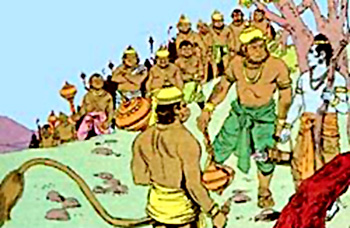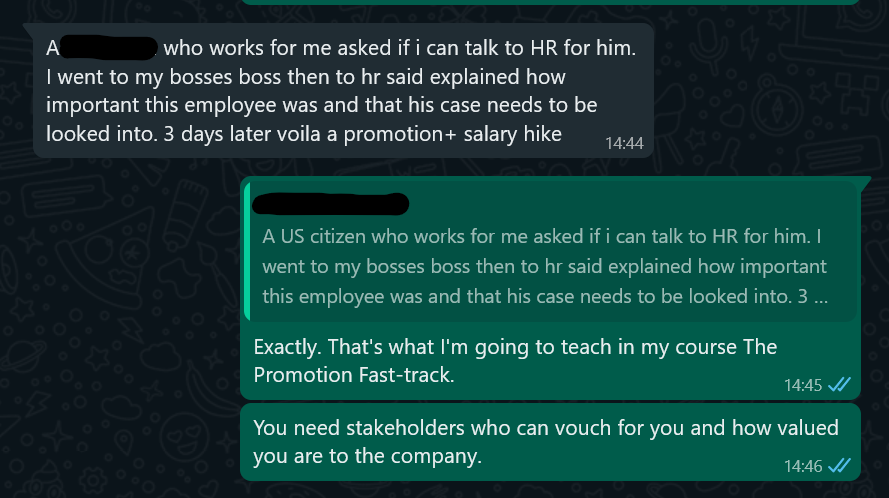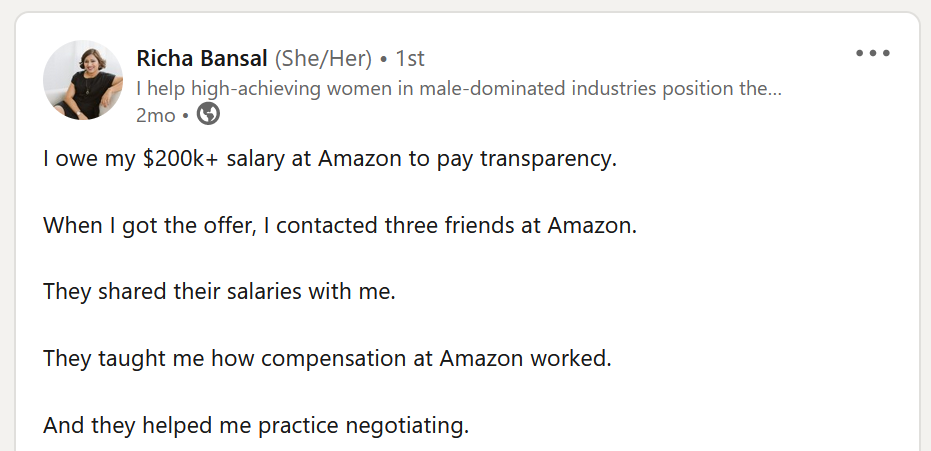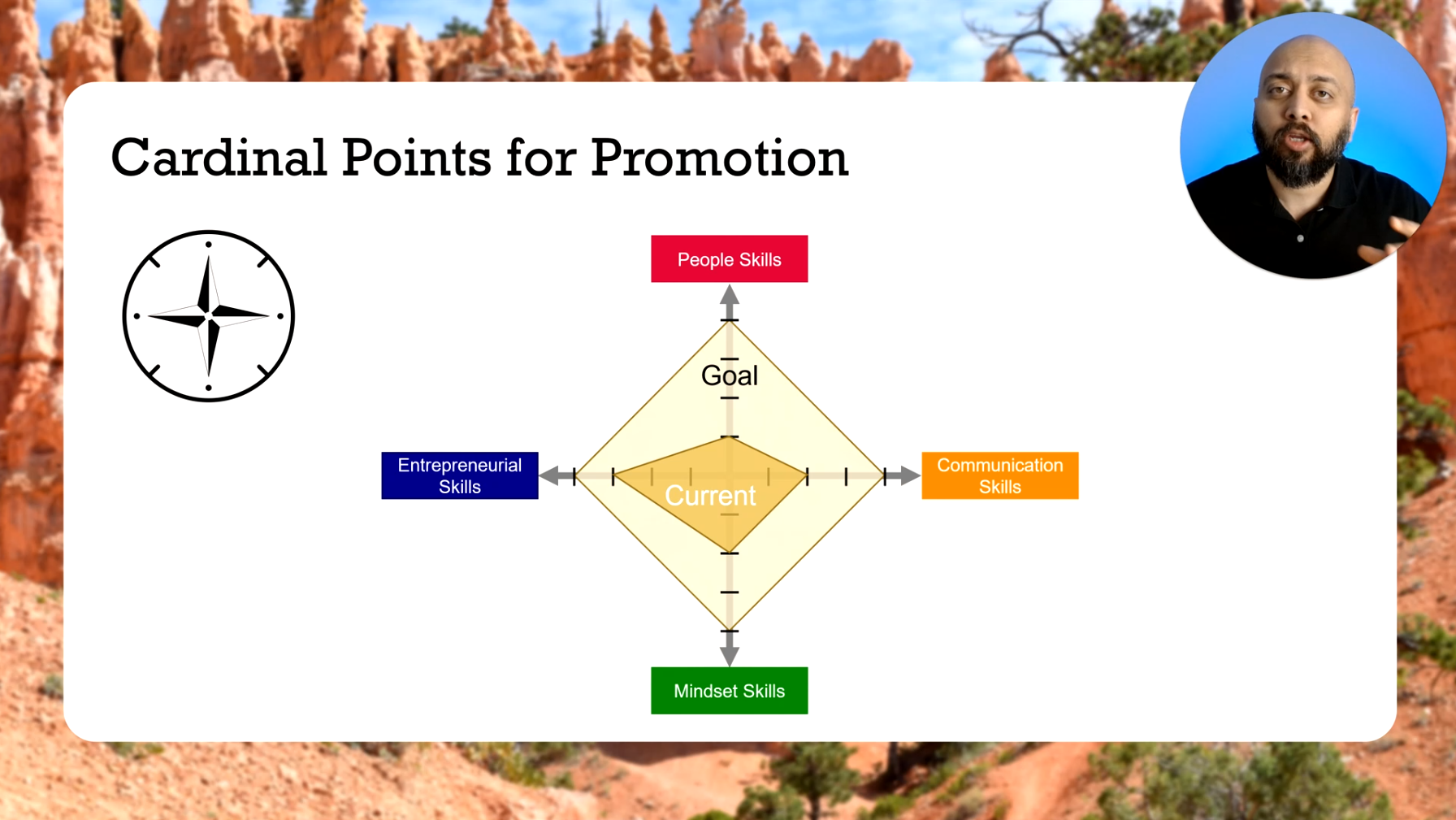
A negotiation is all about leverage.
A clear example of this is the famous mythology story of Ram and Sughriv.
Ram was a prince of a big kingdom but in exile (long story), and Sughriv was a monkey king also in exile (wronged by his brother Vali for the throne).
When spending years in the forest, Ram’s wife Sita was abducted by the demon king (and scholar) Ravan.
So Ram was without an army, and he bumped into Sughriv. He needed Sughriv’s help. That was Sughriv’s leverage.
Sughriv wanted to defeat his more powerful brother Vali. Now Ram, being extremely powerful, could help with that. That was Ram’s leverage.
And with that, a successful negotiation was won by both sides.

–
Notice how I said both sides won.
That is what a successful negotiation looks like.
But it will only happen if we have as much leverage as the company.
We can get leverage in three ways:
- Champion
- Market data
- Loss aversion
There’s a bonus 4th as well.
Let’s dive in below.
1. Champion
Having a champion in your corner is a huge leverage.
They come in many forms. (Just like Hanuman were for Ram and Sughriv.)
A champion can be our manager who fights for us in rooms we are not present in. Like my friend did for their direct hire. At large companies (he works in a Fortune 30 company), a lot more decisions are made behind the scenes. That’s where our manager’s role is extremely effective. Here’s what my friend did.

Champions can be mentors we invest in – either by buying their product or devoting time and energy to building a relationship – and they teach us how to negotiate. Like Ramit Sethi’s dream job program did for me.
Champions can be friends who work at your target company or present company and give you some salary transparency. Like my friend Richa Bansal got from her friends at Amazon.

This led to a $200k+ salary.
And finally, champions can be our hiring manager who likes us so much that they make exceptions and challenge the HR team to make a better offer.
Who is going to be your champion in an upcoming negotiation?
If you have no-one, or want an additional one, give me a shout-out.
2. Market data
There’s a quote about leverage by FBI negotiator Chris Voss (author of the Never Split The Difference book), “Real leverage is in the ability to obtain information that may have been purposefully hidden from you or information that no one else can get.”
I think it applies greatly when it comes to market data.
Although data has become a lot more transparent, we still have to mine it and position it appropriately to be effective.
That is where I have seen my mentees struggle. So here is how to mine and position your data in three steps.

First, go to one of the many websites that now share salary data:
In the screenshot above, in 2014, I used SAE salary survey data (perfect for my role) and salary.com data.
Now I would mine data from the applicable 12 sources (even a couple are enough):
1. Comparably: All industries
2. Salary.com: All industries
3. Glassdoor: All industries
4. Payscale: All industries
5. Elpha: For women
6. Repvue: Tech sales
7. Fishbowl: Tech heavy
8. Levels.fyi: STEM heavy
9. H1Bgrader: Immigrants
10. Stilt[dot]com: Immigrants
11. H1Bdata.info: Immigrants
12. Blind: Community advice app
Second, I would share the right data.
Use filters such as job title, company type, years of experience, geographical location, industry, and/or highest degree to get data that is a fair representation.
Then I would take screenshots and save them in a catch-all presentation.
I would also put the 50th percentile, 75th percentile, and max salary in a spreadsheet.
Now I have the irrefutable numbers. Next involves a bit of art.
Third, positioning.
Why should I at least get the 50th percentile? Or what makes me a candidate for the 75th or the 100th percentile salary?
That depends on how I position my tangible performance.
- My technical work and its quality
- My performance feedback
- My project’s outcome
And most importantly, how effective I am on the intangibles.
What I call – The Cardinal Points for Promotion.

🤝🏼 People skills:
- Leading with empathy
- Developing stronger relationships
- Being approachable while maintaining boundaries
📣 Communication skills:
- Clarity in thought
- Handling difficult conversations like a pro
- Knowing the audience I’m communicating with
🧠 Mindset skills:
- Having a strong internal locus of control
- Showing up for my team with the right attitude
- Developing trust with consistency and credibility
💵 Entrepreneurial skills:
- Knowing my customers deeply
- Taking initiative and working with autonomy
- Diffusing my work so that others multiply the value
These three steps in conjunction can make-or-break a negotiation before it even begins.
I share exact strategies to develop the Cardinal Points for Promotion in my course – The Promotion Fast-track for Immigrant Professionals.
3. Loss aversion
Loss aversion is a cognitive bias that describes why, for individuals, the pain of losing is psychologically twice as powerful as the pleasure of gaining. The loss felt from money, or any other valuable object, can feel worse than gaining that same thing.
This is quite evident in negotiation circumstances.
- A hiring manager doesn’t want to restart the hiring process.
- A hiring manager doesn’t want to lose you to another offer.
- A team manager doesn’t want to lose a top performer.
- A company doesn’t want to lose based on a fair offer.
So if you have a job offer from an interested company, that is leverage because the company would hate to want to restart the process as that is a huge loss of money and time.
If you have multiple job offers, that is an extremely powerful evidence of your worth.
Be cognizant that by default you have leverage because of loss aversion.
BONUS tip #4: Sexy indifference.
This is our ability to have the confidence to say no (when terms are not fair) and walk away.
Sexy indifference is a term I first heard from Jason Bateman of the Smartless podcast. More details here.
–
That’s everything about how me and my mentees have implemented as leverage in a negotiation.
I wish you the best of luck for the next one.
